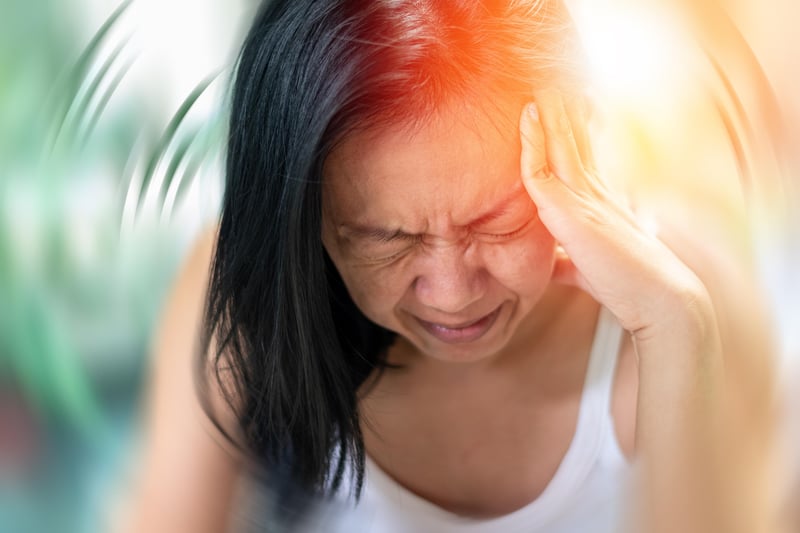Get Healthy!

- Amy Norton
- Posted August 14, 2023
'Magic Mushroom' Drug Psilocybin Shows Early Promise in Easing Migraines
Psilocybin, the active ingredient in "magic" mushrooms, is getting renewed interest as a potential treatment for various health conditions. Now, a new research review argues that migraines should be added to that list.
Psilocybin mushrooms have long been used recreationally as hallucinogens -- meaning they alter users' perceptions of their surroundings. That can lead to euphoria on one end of the scale, or -- if things go badly -- anxiety, panic or dangerous hallucinations.
Medical research into psychedelics like psilocybin and LSD began in the 1950s, and then famously ended after a surge in recreational use by the 1960s "counterculture."
But recent years have seen a new interest in the drugs as medical therapy. Researchers at institutions such as Johns Hopkins University, New York University and the University of California are studying psilocybin as a treatment for conditions like depression, addiction and eating disorders.
While most of the research is focused on psychiatric conditions, psilocybin has also shown hints of promise against cluster headaches and migraines.
In the new review, published recently in the journal Current Pain and Headache Reports, Dr. Emmanuelle Schindler, an assistant professor of neurology at Yale School of Medicine, describes the research done so far.
That includes her own 2021 pilot trial, where Schindler and her colleagues tested the effects of psilocybin -- given under medical supervision -- in 10 patients with migraines. They found that a single low dose of the drug cut participants' headache frequency in half over the next two weeks, versus a two-week period after they received a placebo.
"This was a preliminary, proof-of-concept study," stressed Schindler. "We wanted to see if we could catch a signal."
So far, that study is the only published clinical trial of a psychedelic drug in treating migraine, according to Schindler. And it was too small and short-term, she said, to draw any firm conclusions.
But the findings spurred her team to start a somewhat larger trial -- of about two dozen migraine patients -- that is ongoing.
In the United States alone, about 39 million people suffer from migraines, according to the American Migraine Foundation. Besides intense head pain, the condition often causes symptoms like nausea, visual disturbances and sensitivity to light and sound.
There are various prescription medications that can stop migraine attacks in their tracks, including classes of drugs known as triptans, ergots and gepants.
"But no one treatment works for everyone," Schindler said. "And a treatment that was effective for someone can stop working over time."
So there is a need for additional options, she said.
The idea of using psilocybin against migraines is not far-fetched. The drug, like other psychedelics, exerts its effects by stimulating certain brain receptors for the chemical serotonin. That makes it similar to many standard migraine medications, which also act on serotonin receptors (albeit differently).
In fact, Schindler said, it's long been known that some people with cluster headaches self-treat with very small doses of psilocybin mushrooms or LSD. Cluster headache, an uncommon disorder, causes severe head pain that can last for weeks to months, followed by a period of remission.
There has been a bit more study of psilocybin for cluster headache, according to Schindler. Again, that includes her own small trial, published in 2022, where three very low doses of psilocybin -- given about five days apart -- reduced headache frequency over eight weeks for some patients, but not all.
When it comes to migraine, Schindler sees psilocybin as a potential "transitional" therapy. That refers to treatments given in a single dose, or for a short period, that have lasting effects.
There are already some transitional therapies for migraine, said Dr. Shae Datta, a neurologist at NYU Langone Health in New York City. Some patients receive nerve block injections, for example, to stop a severe acute attack and bring relief that can last weeks to months.
Datta, who is not involved in the psilocybin research, agreed that new options for migraine treatment are always welcome.
She called the research done so far "a good initial step." But, Datta stressed, there clearly needs to be more study, of larger, more diverse groups of patients, to follow the safety and long-term effectiveness of psilocybin.
In the 2021 trial, Schindler's team treated patients with a psilocybin dose of 10 milligrams per 70 kilograms of body weight -- on par with what's been used in studies of psychiatric conditions.
The ongoing trial, Schindler said, is comparing a single psilocybin dose against two doses, given about a week apart. And it's following patients over two months, rather than two weeks.
To be a practical transitional therapy, Schindler explained, psilocybin would have to show lasting benefits.
Safety, of course, is primary, too. Psilocybin is given under medical supervision so that patients can be monitored. And they do often have a "psychedelic experience" in that period -- including, in Schindler's trial, a feeling of "peace/harmony."
Interestingly, though, there seems to be no correlation between the degree of such psychedelic effects and whether patients get headache relief.
"People don't have to have that psychedelic experience," Schindler said, noting that is different from what's been seen in psychiatric research.
So, why would psilocybin bring lasting relief to some headache sufferers? One theory, Schindler said, is that it creates changes in neural connections in the brain that persist.
But the "how," she added, remains one of the big questions.
More Information
The American Migraine Foundation has more on migraine treatments.
SOURCES: Emmanuelle A.D. Schindler, MD, PhD, assistant professor, neurology, Yale School of Medicine, New Haven, Conn.; Shae Datta, MD, co-director, Concussion Center, NYU Langone Health, New York City; Current Pain and Headache Reports, Aug. 4, 2023, online







